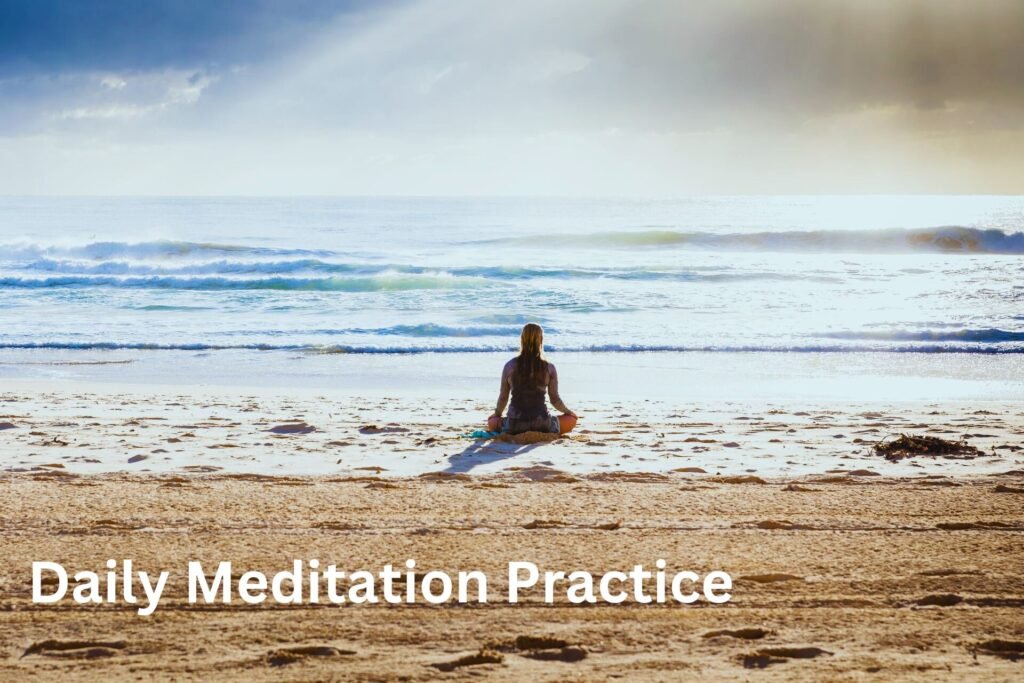Introduction:
Daily meditation practice have you ever attempted to learn a new skill or form a new habit? You probably understood on quickly that consistency in practice was the key to success. That also applies to meditation, though.
“Meditating on a daily basis is crucial as it helps you develop a habit,” says Sadie Bingham, a clinical social worker in Gig Harbor, Washington, who specializes in anxiety. She has also been meditating for a long time.
It is quite feasible, and following six success strategies can assist.

Daily meditation practice, Start small
Although it’s an excellent aim to do daily meditation practice and meditate every day, you don’t have to start off by meditating for thirty minutes or more every day.
You might not feel extremely calm or aware at first. Perhaps you don’t feel at all at ease. However, that’s alright. Just set a goal to sit with your thoughts for five minutes.
- Establish reasonable objectives: Start small, just a few minutes a day. Increase the length progressively as you get more comfortable.
- Locate a quiet place: Decide on a location where you won’t be bothered. It may be a quiet area in the outdoors or a corner of your room.
- Become at ease: Choose a comfortable position to sit or lie down. You can rest on your back, lean on a cushion, or even sit. Being alert and composed at the same time is the key.
- Shut your eyes and concentrate on taking deep breaths and exhalations. After then, let your breathing settle back into its regular pattern and do daily meditation practice.
- Be present: It’s normal for your thoughts to wander. Bring your attention back to your breathing softly when you see it straying. Repetition of a word or phrase (such as “peace” or “I am here”) to oneself in silence is another way to help you focus.
- Start small: Don’t stress over reaching mental emptiness. Just being aware of your thoughts without becoming sucked into them is the aim.
- Treat yourself with kindness: it’s normal to find some days difficult than others. Since meditation is a practice, treat yourself with kindness and patience as you get better at it.
- Remain consistent: To create a habit of daily meditation practice, attempt to meditate at the same time every day. Maintaining consistency is essential to fully benefiting from meditation.
Find the right time
You’ll find that a number of sources recommend different “ideal” times to meditate. Actually, though, the best time to meditate is whenever you can manage it.
If you force yourself to meditate when it conflicts with your obligations and schedule, you will probably only become upset and lose motivation to meditation.
Rather, experiment with different meditation times to determine what suits you the best and do daily meditation practice. It might wind up being the first thing you do in the morning, just before going to bed, during a hectic commute, or during your work break.
Try to stick to the time you have chosen. Maintaining consistency will enable your new habit to blend in with the rest of your regular activities.
Get comfortable
It’s likely that you’ve seen pictures of individuals sitting in the traditional lotus position during meditation and daily meditation practice. However, not everyone finds comfort in that posture, and mediating when performing an action that causes you bodily discomfort is difficult.
Thankfully, there is no specific posture required for effective meditation. Instead, simply choose a comfortable, natural position that you can maintain. Lying down or sitting on a chair are both perfectly acceptable.
Consider walking or standing while meditation if you find it difficult to remain motionless.
Additionally, think about setting up a calming, cozy area for meditation, or perhaps develop a ritual around the practice.
According to Bingham, the ritual has additional benefits because it becomes a statement about how important your wellness is and daily meditation practice.
Try a meditation app or podcast
Are you still a bit unclear about the proper way to meditate?
Refer to your smartphone whenever you’re unsure. Almost anything can be done with an app these days, and daily meditation practice is no different.
Apps can be used to access:
- Meditations suited to many contexts
- Calming sounds
- Breathing exercises
- Podcasts
Additionally, you may customize the app to track your progress and alter your daily meditation practice strategy according to your current mental condition.
Keep at it
You shouldn’t be alarmed if meditation doesn’t appear to work for you right away since it takes time to build new habits.
Consider whatever challenges you’re facing with curiosity and an open mind, rather than searching for reasons why you can’t continue daily meditation practice. The difficulties you encounter while meditation might help you develop a more fruitful routine.
According to Bingham, you may more readily translate these emotions into your everyday life by learning to meditate with acceptance and curiosity.
This may make it simpler for you to consistently cultivate awareness.
Consider it this way: You may feel a bit better if you begin daily meditation practice when you are feeling agitated and nervous. However, if you maintain a regular meditation routine, you may discover that it’s simpler to control your stress levels before your emotions get the better of you.
Know when it’s not working
The advantages of meditation might not become apparent right away. That is entirely typical. Furthermore, even after training for a while, your thoughts may occasionally stray. That is also typical.
These two factors do not exclude you from becoming successful with meditation and daily meditation practice. It’s really a positive thing to realize when your thoughts have strayed since it indicates that you are become more conscious. Just softly concentrate yourself when this occurs. You should eventually start to see advantages if you maintain a regular meditation practice.
Elevated levels of anxiety, panic, or sadness. Before continuing with meditation if it often makes you feel worse, you might wish to see a therapist.


